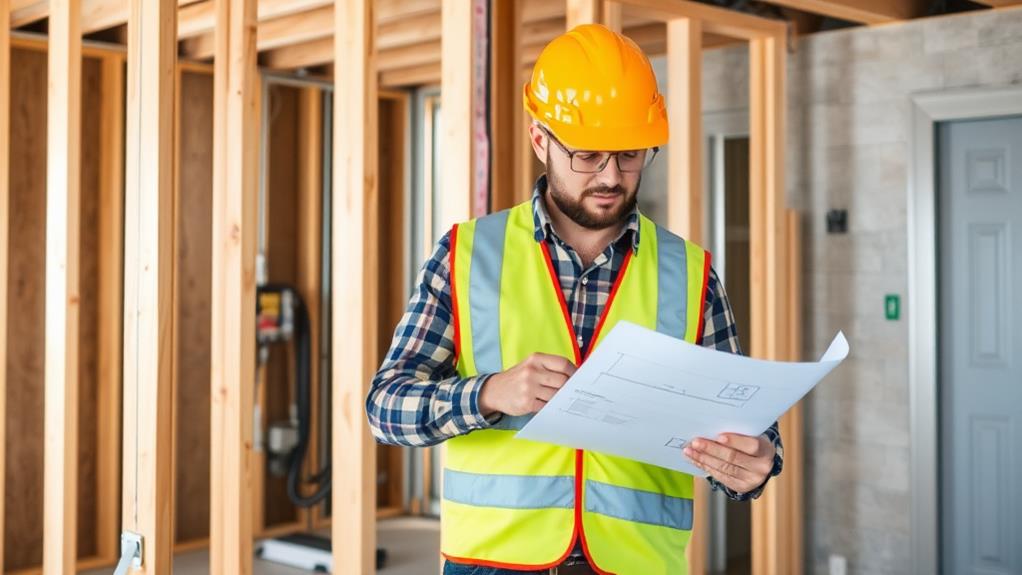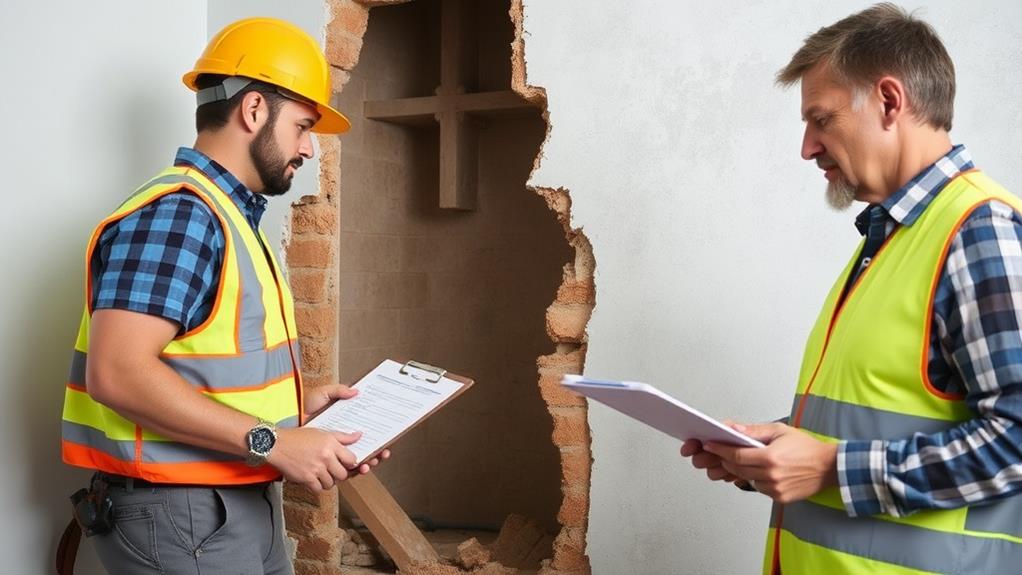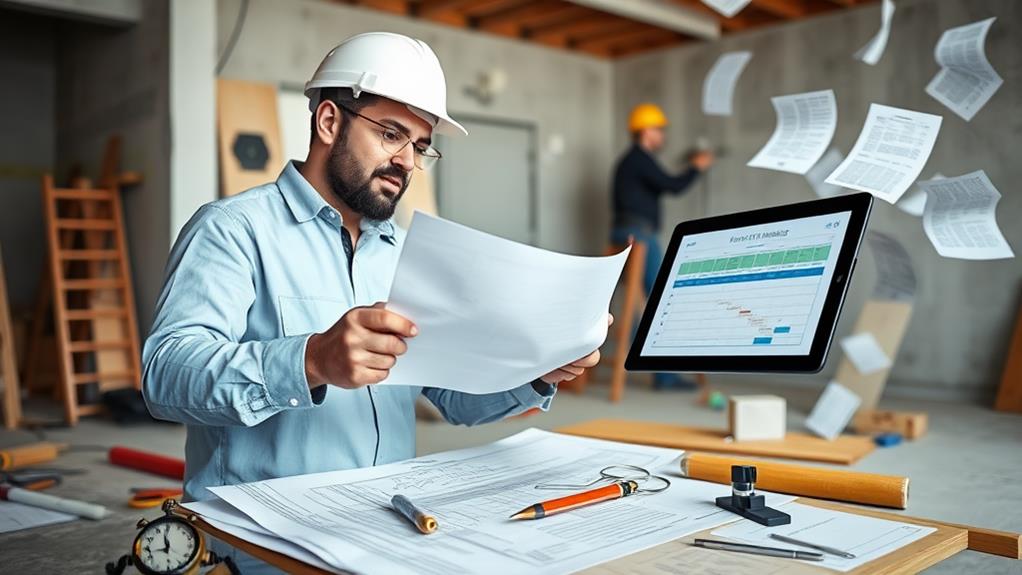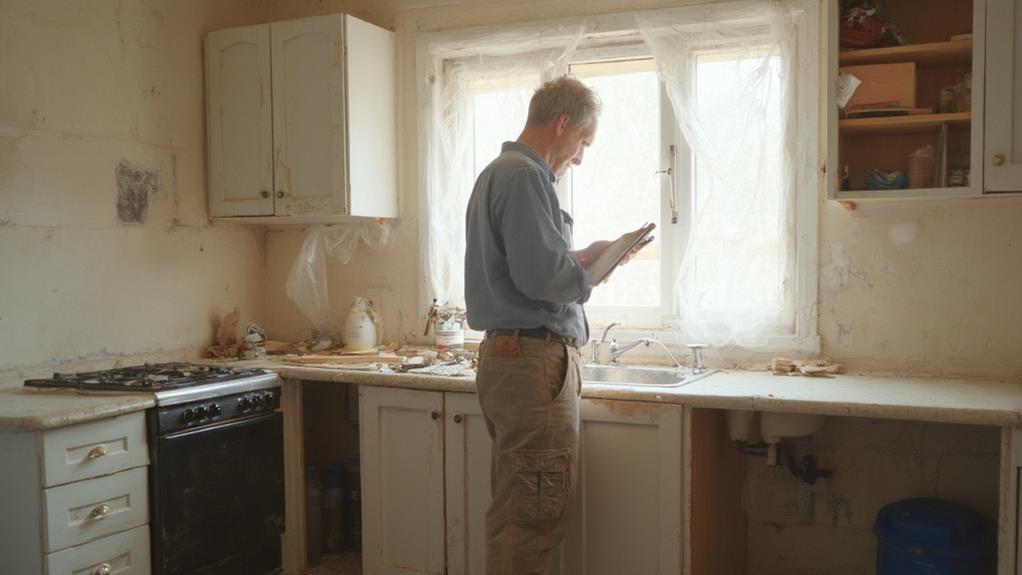Professional inspections are integral to successful renovation project management. They ensure compliance with building codes, identify hidden issues, and contribute to cost savings through early detection of problems. These inspections play a vital role in quality assurance, verifying that work meets established standards and specifications. By uncovering potential issues before they escalate, inspections help streamline project timelines and prevent costly delays. Additionally, they provide legal protection for stakeholders by documenting the condition and progress of the renovation. Understanding the multifaceted benefits of professional inspections can significantly enhance the efficiency and outcomes of renovation projects.
Ensuring Compliance With Building Codes

Building code compliance is a critical aspect of any renovation project management. It ensures that the renovated structure meets safety, health, and performance standards set by local and national authorities. Project managers must stay updated on current building codes and regulations, which can vary by jurisdiction and change over time. They need to incorporate these requirements into the project plan from the outset, considering factors such as structural integrity, fire safety, electrical systems, plumbing, and accessibility.
Professional inspections play a crucial role in verifying code compliance throughout the renovation process. These inspections should be scheduled at key stages, such as before closing up walls or ceilings, to allow for thorough examination of hidden elements. Inspectors assess work quality, materials used, and adherence to approved plans and specifications. They also identify any code violations or safety hazards that require correction.
Identifying Hidden Issues
While ensuring code compliance is vital, renovation project managers must also be adept at identifying hidden issues that may not be immediately apparent. These concealed problems can significantly impact project timelines, budgets, and overall success if left undetected. Professional inspections play a crucial role in uncovering these hidden issues, providing valuable insights that inform decision-making and risk management strategies.
Common hidden issues include structural damage, water intrusion, electrical system deficiencies, and hazardous materials such as asbestos or lead. Experienced inspectors utilize specialized tools and techniques to detect these problems, such as thermal imaging cameras, moisture meters, and non-destructive testing methods. They also rely on their expertise to interpret subtle signs and symptoms that may indicate underlying issues.
Cost-Saving Through Early Detection

By identifying hidden issues early in the renovation process, project managers can significantly reduce overall costs and minimize potential disruptions. Early detection allows for proactive planning and budgeting, preventing costly surprises and change orders during construction. Professional inspections play a crucial role in this cost-saving strategy by uncovering underlying problems that may not be visible to the untrained eye.
Inspectors can identify structural issues, electrical deficiencies, plumbing problems, and other potential hazards before work begins. This information enables project managers to address these issues upfront, often at a lower cost than if discovered mid-renovation. Additionally, early detection helps avoid time-consuming delays and rework, which can significantly impact project timelines and budgets.
Furthermore, addressing hidden issues early can prevent more extensive damage and deterioration, potentially saving substantial amounts on future repairs. By investing in thorough inspections at the outset, project managers can make informed decisions about materials, techniques, and resource allocation, ultimately optimizing the renovation process and maximizing cost-efficiency. This proactive approach not only saves money but also ensures a smoother, more predictable renovation experience for all stakeholders involved.
Quality Assurance in Renovation
Quality assurance is a critical component of successful renovation project management. It ensures that all aspects of the renovation project meet or exceed industry standards, client expectations, and regulatory requirements. Implementing a robust quality assurance program involves systematic monitoring, inspection, and documentation throughout the renovation process.
Key elements of quality assurance in renovation include establishing clear quality standards, developing a comprehensive quality control plan, and conducting regular inspections at various project stages. These inspections should be performed by qualified professionals who can identify potential issues and ensure compliance with building codes and safety regulations.
Quality assurance also involves proper material selection, workmanship evaluation, and adherence to project specifications. By implementing rigorous quality control measures, project managers can minimize defects, reduce rework, and enhance overall project outcomes. This approach not only improves the final product but also contributes to client satisfaction and long-term durability of the renovated space.
Effective communication and documentation are essential for maintaining quality standards. Regular progress reports, detailed checklists, and photographic evidence help track quality issues and facilitate prompt resolution. By prioritizing quality assurance, renovation project managers can deliver superior results and build a reputation for excellence in the industry.
Streamlining Project Timelines

Throughout renovation projects, streamlining timelines is essential for maximizing efficiency and minimizing disruptions. Effective project managers employ several strategies to optimize schedules and ensure timely completion.
One key approach is creating a detailed project plan with clearly defined milestones and deadlines. This plan should account for potential setbacks and include buffer time for unexpected issues.
Implementing concurrent workflows is another effective method for expediting timelines. By scheduling multiple tasks to occur simultaneously when possible, project managers can significantly reduce overall project duration. Additionally, leveraging technology such as project management software and digital collaboration tools can enhance communication and coordination among team members, subcontractors, and clients.
Proactive resource management is crucial for maintaining smooth project progression. This involves anticipating material needs, scheduling deliveries strategically, and ensuring adequate labor availability throughout the renovation. Regular progress monitoring and adapting the timeline as necessary helps keep the project on track. By identifying and addressing potential bottlenecks early, project managers can prevent delays and maintain momentum.
Ultimately, streamlining project timelines requires a combination of meticulous planning, efficient execution, and adaptability to changing circumstances.
Legal Protection for Stakeholders
In renovation project management, safeguarding the legal interests of all stakeholders is paramount. Effective legal protection ensures that all parties involved, including property owners, contractors, subcontractors, and suppliers, are shielded from potential disputes and liabilities. This protection is typically achieved through carefully drafted contracts, permits, and insurance policies.
Contracts should clearly outline the scope of work, timelines, payment terms, and dispute resolution mechanisms. They must also address issues such as change orders, warranties, and indemnification clauses. Obtaining necessary permits and adhering to local building codes is crucial to avoid legal complications and ensure compliance with regulations.
Comprehensive insurance coverage is essential for protecting against unforeseen circumstances, property damage, and potential injuries. This includes general liability insurance, workers' compensation, and professional indemnity insurance for designers and project managers.
Regular documentation of project progress, including photographs and written reports, can serve as valuable evidence in case of disputes. Implementing a formal change order process helps prevent misunderstandings and provides a clear record of modifications to the original plan.
Frequently Asked Questions
How Often Should Professional Inspections Be Conducted During a Renovation Project?
Professional inspections should be conducted at key project milestones, typically at the beginning, during critical phases, and upon completion. Frequency may vary based on project complexity, local regulations, and specific requirements, but regular inspections ensure quality and compliance throughout the renovation process.
What Qualifications Should I Look for When Hiring a Professional Inspector?
In a world where every decision is monumental, choosing the right inspector is crucial. Look for professionals with relevant certifications, extensive experience, strong references, and knowledge of local building codes. Ensure they're licensed, insured, and possess excellent communication skills.
Can I Perform Some Inspections Myself to Save Money?
While you can conduct basic visual inspections, it's advisable to rely on professional inspectors for comprehensive evaluations. DIY inspections may miss crucial issues, potentially leading to costly oversights. Professional inspectors possess specialized knowledge and tools for thorough assessments.
How Long Does a Typical Professional Inspection Take for a Renovation Project?
The duration of a professional inspection for a renovation project typically ranges from 2 to 4 hours, depending on the property's size, complexity, and scope of work. Larger or more intricate projects may require additional time.
Are There Specific Types of Inspections for Different Renovation Project Stages?
Like a building's blueprint, inspections are tailored to each project phase. From pre-renovation assessments to final walkthroughs, specific inspections target structural integrity, electrical systems, plumbing, HVAC, and code compliance at various stages of the renovation process.
Conclusion
Professional inspections play a pivotal role in the orchestration of successful renovation endeavors. These evaluations serve to ensure regulatory adherence, uncover latent challenges, and facilitate fiscal prudence through preemptive identification of potential issues. Moreover, they contribute to the assurance of quality craftsmanship, optimize project chronology, and afford legal safeguards to involved parties. The judicious incorporation of expert assessments in renovation management ultimately cultivates a more refined, efficient, and risk-mitigated process, elevating the overall caliber of the undertaking.

